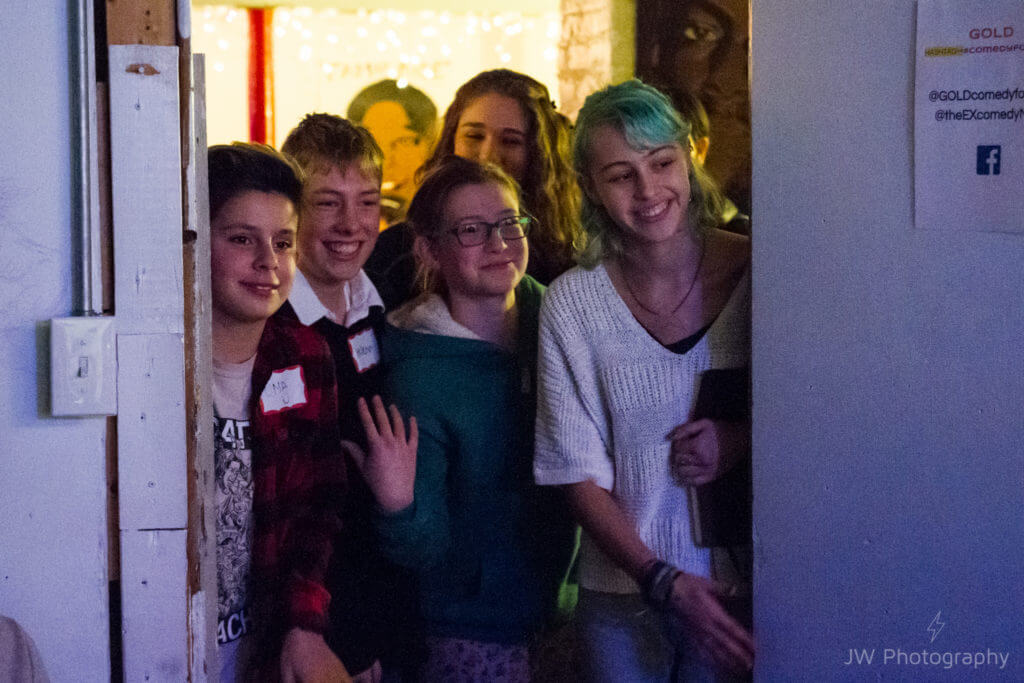6 reasons why shy people are great at comedy

So many people say, “Oh, I would do comedy, but I’m too shy.”
Sorry, but that excuse is made of NOPE. Comedians ARE shy. Why do you think they like to talk on stage, or wear giant funny mustaches? So they don’t have to talk TO PEOPLE. Carol Burnett, who describes herself as shy, has said she can perform only when she’s in character. Joan Rivers–yes, Joan Rivers—has described feeling uncomfortable chatting in real life, one on one.
“Even though standup and comedy seem like mediums that lend themselves to the extroverted, most comedians are actually shy or grapple with some form of social anxiety,” writes self-described shy comedian Scarlet Meyer. “Just because we have confidence on stage doesn’t mean it follows us off stage.”
Anthropologists at the University of New Mexico studying the evolutionary value of humor found that professional comedians are very likely to fit the definition of introvert. Makes sense when you recall that if you’re a comic, the biggest slices of the pie chart of your life are probably being (alone) on the road and writing jokes.
So being shy isn’t an excuse not to do comedy. Being shy is a reason to do comedy. Comedy is about being who you are. And if who you are is shy, then shy is part of your funny.
More reasons why you, our shy friend in the corner, should do comedy:
Shy people may have more to say.
As Judy Carter says in her iconic Standup Comedy: The Book: “Most standups are very shy in their personal lives, and going on stage is a great outlet. The stage gives you an arena to vent your repressed criticisms of the world. I find that the quieter the person is offstage, the more he or she has to say onstage. Once they get the chance to be heard, my shy students are the ones I can’t get to stop talking.”
Shyness itself is funny.
Your comedy can be ABOUT how shy you are. Comic Daniel Simonsen, for example, says (around 7:00 here), “One of the hardest things about being shy is that you don’t have anywhere to live. Because all of the ads for shares are for ‘outgoing’ people.”
40% of teens and adults consider themselves shy. That’s a lot of people who will directly relate to your “I’m shy” material and persona. And not come up and tell you that afterwards! HA!

A lot of comedy happens in your head.
“I didn’t talk to anybody in school,” says New York comedian Carly Aquilino. “Maybe I started doing comedy because I talked to myself for a really long time.” Think of comedy like a funnel: the big top part is the observing and thinking you have to do, which you then narrow down, and then—only then—do you get on stage and tell people what you’ve been thinking. The capacity to hang back and observe and cogitate can only work in your favor.
Shy people are super observant.
If you tend toward introversion, you may excel at empathy and reflection—both essential for writing authentic jokes that truly land. That’s because you’re both self-aware and aware of others’ vibes, and you’re also able to learn from what worked and what didn’t.
What’s more, the things you notice because you feel awkward can lead directly to nuanced, personal) jokes. “A simple reflection like, “‘Why did they make that face when I said x?’ might lead to an amazing bit about being awkward,” notes comedy and creativity coach Jared Volle, M.S. “Introverts love asking themselves these types of questions, which can be a powerful ally in their comedy career.”
Shy people know how to listen.
“Shy people are often gifted listeners,” write shyness experts Bernardo Carducci, Ph.D. and Philip G. Zimbardo. That means you’re more likely to be noticing what people say (or what they avoid saying) and how they say it—all of which is potential material.
This also may mean that you’re good at listening to your audience—an essential skill for connecting to the vibe in the room and the only way to perfect your sense of timing.
Outside your comfort zone lies comedy gold.
“A lot of comedians are very introverted, very shy, very sensitive to humiliation,” says Patton Oswalt. “The only way to combat it is to go to the one place where you are stripped bare.”
Arguably, anyone who has more at stake and more to fight in order to get up on stage is going to have more of a raw, vulnerable comedy edge. And letting yourself be vulnerable is actually the bravest, most assertive—and funniest—thing you can do.
Read Lynn’s bio here.
